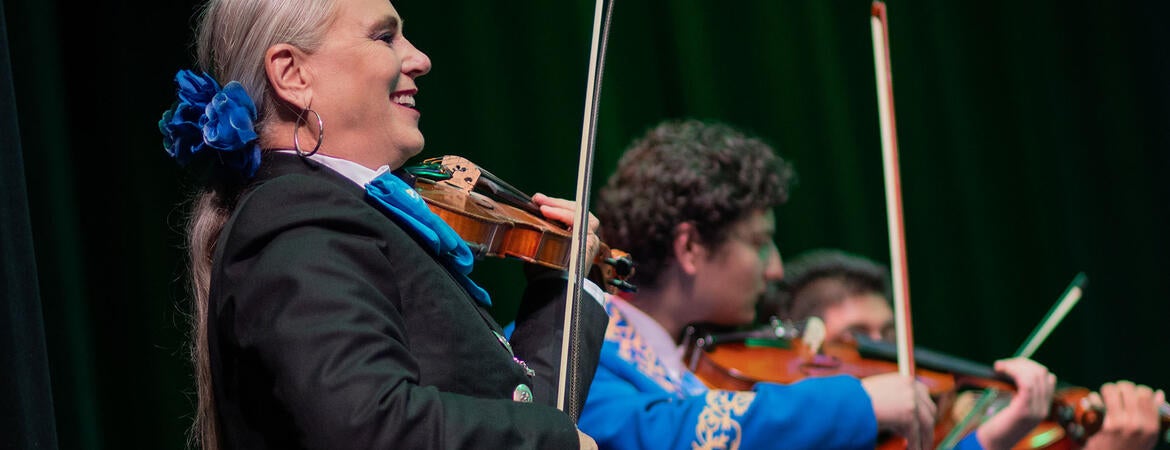College of Humanities, Arts, and Social Sciences

The World Music Festival was hosted in the University Theatre on May 2 at 7 p.m. by Professor Jonathan Ritter, chair of the Department of Music at UC Riverside. The festival has been held for approximately the last 20 years, celebrating music from around the world and highlighting some of UCR’s key cultural music ensembles.
The first to perform was the UCR Javanese Gamelan Ensemble, led by director Joko Sutrisno. The Gamelan Ensemble focuses on a set of instruments — referred to as gamelan — from the Java and Bali islands of Indonesia.
The instruments include tuned gongs, chimes, and metal keyed instruments, as well as several xylophones, stringed instruments, and flutes. The ensemble was first founded in 1996, but took a break during quarantine. However, the group was revived two years ago under the new direction of Sutrisno. The music can best be described as careful, ornate, and melodic. While most of the instruments were some form of percussion, they were all pitched, or capable of playing multiple notes. This added depth and variety to the performance.
The second group on stage was the UCR Rondalla Ensemble, led by director Tagumpay “Pi” de Leon. The group played 6 numbers in the traditional Filipino style of rondalla, which features a number of small, guitar-like stringed instruments. The string quintet was very quick in time, supported by a large, steady bass-like instrument that tempered the sound of the music.
Rondalla is the result of large-scale intercultural blending, a reflection of the years of Spanish colonization in the Philippines. The group at UC Riverside was founded in 2001. In 2021 de Leon was named a National Heritage fellow by the National Endowment for the Arts, and is largely regarded as a master musician in his subject.
The third group to perform — and the last of the first act — was Mayupatapi, the UCR Latin American Music Ensemble led by director Emilia Moscoso Borja. Mayupatapi means Riverside in the Quechua language, and the group draws from a variety of Latin American musical practices. Mayupatapi has been performing since 2005, and has been performing under the direction of Borja since 2024.
Their first song drew from Andean panpipe tradition, and involved a circular running movement of the performers while also playing panpipes. Ritter performed with the ensemble, playing both a panpipe and a drum at the same time. The group’s other music included an Afro-Peruvian piece and a Brazilian percussion piece, among others. Several songs involved the use of an instrument that appeared to be a piece of bone, while others utilized percussion through drums or wooden boxes. Other songs still included singing and flutes. Mayupatapi’s music was varied and unique.
Following intermission, the show was brought back by Mariachi Los Alteños de UCR — UC Riverside’s own Mariachi group — led by director Cynthia Reifler Flores. Mariachi is a musical practice from Mexico, and involves the use of guitars, violins, (acoustic) bass guitars, trumpets, and singing.
Each song had a different member of the ensemble singing, including several duet and group numbers. The ensemble's closing number, “Homenaje a Selena,” was a mashup, mariachi cover of two of Mexican-American artist Selena Quintanilla’s songs, “Bidi Bidi Bom Bom” and “No Me Queda Más.”
The night’s closing act was the UCR Taiko Ensemble, led by director Terry Nguyen. Each piece the ensemble played displayed differences in technique, rhythm, and energy. Whereas the first song utilized simpler beats and basic call and response, the last song involved several choreographed movements, including jumps, elaborate, deliberate movement, and even a few moments when the performers ran to swap to themselves between the drums.
Taiko is a Japanese drum tradition, and in a North American context refers to a modern tradition of group drumming drawn from several older traditions. The UCR Taiko Ensemble was established in 1998, and has been under the direction of Nguyen since 2017. Nguyen was actually a pupil of a founder of the UCR Taiko ensemble.
Future CHASS music events like this can be found at events.ucr.edu or music.ucr.edu.
For more information about the Gamelan Ensemble, please visit music.ucr.edu/gamelan-ensemble. The group meets every Wednesday from 6 to 9 p.m. and is open to all UCR students. Information about the Rondalla Ensemble is available at music.ucr.edu/rondalla.
For more information about Mayupatapi, please visit music.ucr.edu/mayupatapi. The group meets Thursdays from 6 to 8:50 p.m, and is open to UCR students as well as community members. To learn more about Mariachi los Alteños, visit music.ucr.edu/mariachi-los-altenos.
Information regarding the UCR Taiko Ensemble can be found at music.ucr.edu/taiko-ensemble.
FEATURED PHOTO. Director Cynthia Reifler Flores of Mariachi Los Alteños de UCR plays the violin as she leads the ensemble.